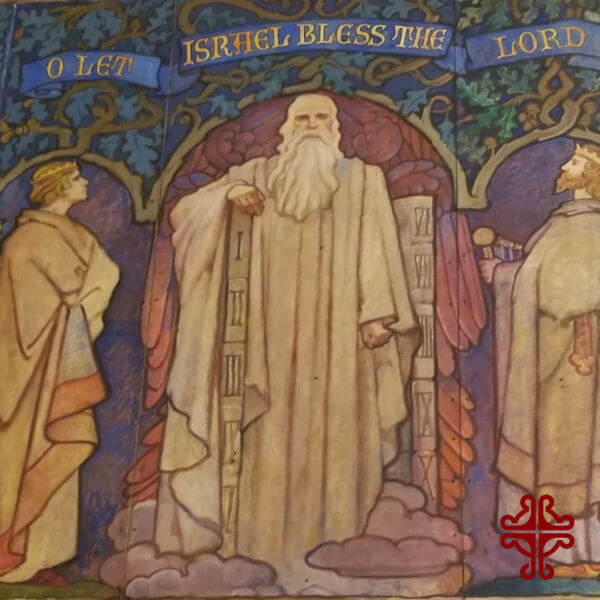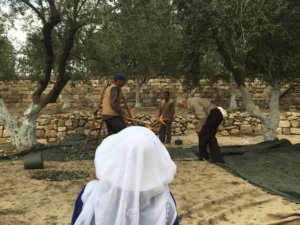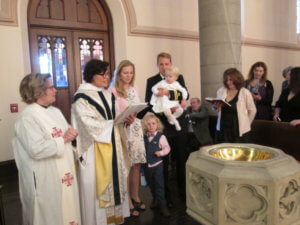
Hope and Memory
I always call Psalm 119, our psalm today, the Lawyers’ Psalm. We sang a few verses of it this morning — that’s 8 out of a total of 176, by the way. It’s the longest psalm we have, and the longest whole chapter in the Bible. No laughing about long-winded lawyers out there!
The reason I call it the Lawyers’ Psalm is that the language is focused on decrees, commandments, statutes, and judgments. The psalmist uses 8 DIFFERENT words for laws and even exclaims every 10 verses or so, Oh, how I love your law! It is my meditation all day long. I feel that way myself — I know it sounds pretty nerdy, but isn’t it true that we come to love what we practice and get good at? Does that ever happen to you with your job, or your family, or your hobby? Sometimes we even start to see other things by the light of what we learn in our lives with our jobs, families, or hobbies, and even guides how we see or do things in the future.
 In the bit we sang today in Psalm 119, the psalmist said he will thank [God] with an unfeigned heart, when [he has] learned [God’s] righteous judgments. “I will keep your statutes,” the psalmist says. The law that the psalmist is talking about here is the Torah — the first five books of the Old Testament as we know it: Genesis, Exodus, Leviticus, Numbers, and Deuteronomy. And it’s really comforting and reassuring to think that just following God’s laws and learning God’s righteous judgments will be a lamp to our feet and a light to our path, as Psalm 119 says.
In the bit we sang today in Psalm 119, the psalmist said he will thank [God] with an unfeigned heart, when [he has] learned [God’s] righteous judgments. “I will keep your statutes,” the psalmist says. The law that the psalmist is talking about here is the Torah — the first five books of the Old Testament as we know it: Genesis, Exodus, Leviticus, Numbers, and Deuteronomy. And it’s really comforting and reassuring to think that just following God’s laws and learning God’s righteous judgments will be a lamp to our feet and a light to our path, as Psalm 119 says.
The law shows up again in our Old Testament reading today. Moses has reached the end of his patience with the wandering Israelites, and he also lays it out like it’s easy — just follow the law. The Israelites have wandered all over the Ancient Near East. They’ve been hungry, thirsty, tired — and really — to tell you the truth — even kind of complaining and quarrelsome — ever since Moses first went up on Mount Sinai to get the 10 Commandments.
Obey the Commandments
 Our reading today happens after all of that wandering, and Moses is making things very plain to them. Here’s what he says: See, I have set before you today life and prosperity, death and adversity. If you obey the commandments of the Lord your God … and observe his decrees and ordinances, then you shall live and become numerous. Just follow the law.
Our reading today happens after all of that wandering, and Moses is making things very plain to them. Here’s what he says: See, I have set before you today life and prosperity, death and adversity. If you obey the commandments of the Lord your God … and observe his decrees and ordinances, then you shall live and become numerous. Just follow the law.
But living in community is hard. While it’s pretty clear how to follow God’s laws — love God with all your heart, love your neighbor as yourself — when we’re living together in community, we sometimes find we have different views, backgrounds, and priorities.
Many times, following Jesus — being a disciple — is not about following the law to choose between good and bad. That’s fairly easy, even for us manifestly flawed human beings. And any good lawyer will tell you that great lawyering is about following the law to get to the best interests and thriving of the whole community. Following the Great Commandments — loving God with all our mind, heart and soul, and loving our neighbors as ourselves — is all about the flourishing of the whole community. Following Jesus — discipleship — is less about choosing between good and bad than it is about choosing between competing goods.
Palm Sunday
 As we walk through these last weeks of Epiphany, we are preparing for Lent, our time of holy reflection and contemplation, when we remember Jesus’ 40-day preparation in the wilderness before he began his earthly ministry. We are also approaching the order deadline for palms for Palm Sunday, when the church remembers Jesus’ walk into Jerusalem at the beginning of our celebration of Holy Week. So how do we prepare for our earthly ministry as followers of Jesus, all as our sacred and secular calendars interweave in real time? How do we use God’s Great Commandments as a lamp to our feet and a light to our path?
As we walk through these last weeks of Epiphany, we are preparing for Lent, our time of holy reflection and contemplation, when we remember Jesus’ 40-day preparation in the wilderness before he began his earthly ministry. We are also approaching the order deadline for palms for Palm Sunday, when the church remembers Jesus’ walk into Jerusalem at the beginning of our celebration of Holy Week. So how do we prepare for our earthly ministry as followers of Jesus, all as our sacred and secular calendars interweave in real time? How do we use God’s Great Commandments as a lamp to our feet and a light to our path?
Here’s a real question — a concrete example: Shall we order ECO palms or traditional, long palms? ECO palms are essentially fair trade palms. At least half of the farmers in Central Guatemala earn additional income from harvesting palm fronds, and more than a quarter of household heads support themselves exclusively by collecting the fronds. Each palm plant produces anywhere from two to five harvestable leaves over a 3-month period, and palm gathering actually protects valuable natural forests. It’s interesting — Palms harvested in this way are whole fronds, with individual leaves fanning out like rays from a center spikey stem.
I’ve seen this kind of palm fronds before in nature, although not in church on Palm Sunday. I grew up with the long, pointed palm fronds, which are about an inch wide at the bottom and have a point at the other end of the approximately 3-foot long flexible leaf. Each long leaf is a tender greenish yellow in the middle, sharpening to a bright leaf green at the edges. I remember sitting on a high stool at the stainless steel countertop in the kitchen at Trinity Episcopal Church in Watertown, New York, where I grew up when I was about six or seven, folding these long palms into individual crosses with my grandmother and the other church ladies.
So do we order ECO palms? They may be unfamiliar to our memories in church, but they offer hope and health to the families who harvest them and the forests that grow them. Or do we order the treasured long palms of our faith and memory?
How Was Jesus Greeted?
I don’t know, but I do believe that asking ourselves that question is at the very nub of living together, practicing God, and preparing ourselves for our earthly ministry. And it’s a really great question for us to work on in community because it is not a matter of scriptural accuracy or orthodoxy. There really is nothing at all about palms in the story of Jesus’ walk from Bethany and Bethphage into Jerusalem. Palm trees grow down in Jericho in the Holy Land, and along the coast in Jaffa, Akko, and Caesarea Maritima. But they were not introduced to Jerusalem until someone brought some up from Jericho and transplanted them outside the Damascus Gate into the Old City in the 1960s.
 When Jesus got on his donkey in Bethany in the first century of the Common Era to ride down the Mount of Olives into Jerusalem at the beginning of his passion, palms were just not part of the picture. The gospel actually refers to “branches from the trees” in most translations. Given the primary type of branches on the Mount of Olives today, those could very well have been olive branches.
When Jesus got on his donkey in Bethany in the first century of the Common Era to ride down the Mount of Olives into Jerusalem at the beginning of his passion, palms were just not part of the picture. The gospel actually refers to “branches from the trees” in most translations. Given the primary type of branches on the Mount of Olives today, those could very well have been olive branches.
Discerning the values and priorities of our community is the central focus of living in community and practicing God. When we live with the Great Commandments as a lamp to our feet and a light to our path, we guide our actions, decisions, and priorities on the main road of loving God with all our heart, mind, and soul, and loving our neighbor as ourselves.
This not a road that leads to the win of one at the loss of another. Discipleship, and practicing God in community, is not as simple as one right and one wrong — pairs of binary decisions — marching two by two down a path lit by the Great Commandments. Practicing God is not a zero sum game. Instead, the Great Commandments guide us on a path of loving compromise and reconciliation that leads to the best interest and thriving of the whole community.
Community
 We’ll have many opportunities in these next months as we work together to imagine, renew, and reenergize our community in its life and mission. We’ll have the chance to remember our history — our favorite parts of the past that made us who we are today. We’ll work together to discover our own special identity — what this community of Emmanuel dreams of being and doing — moving into the future with openness to new possibilities. We’ll work together to reinforce our good relationship with the diocese, so each of us can be a more effective resource and support to the other. This is our shared earthly ministry. Remember, the church is not this building itself, as beautiful as it is. And it’s not me, or Bishop Knisely, or even the The Presiding Bishop of the Episcopal Church, Michael Curry.
We’ll have many opportunities in these next months as we work together to imagine, renew, and reenergize our community in its life and mission. We’ll have the chance to remember our history — our favorite parts of the past that made us who we are today. We’ll work together to discover our own special identity — what this community of Emmanuel dreams of being and doing — moving into the future with openness to new possibilities. We’ll work together to reinforce our good relationship with the diocese, so each of us can be a more effective resource and support to the other. This is our shared earthly ministry. Remember, the church is not this building itself, as beautiful as it is. And it’s not me, or Bishop Knisely, or even the The Presiding Bishop of the Episcopal Church, Michael Curry.
It’s as simple as the rhyme we learned when we were the age of our Emmanuel Day School Children: Here’s the church, here’s the steeple, open the door and see all the people. This is our practice of God together.
This is how our Christian community of Emmanuel lives together in discipleship, which is a path of constant mutual discernment. We’re not usually trying to figure out the difference between right and wrong. That part’s pretty easy. Instead, we’re picking our way down a rocky road of competing goods and different priorities, lit and guided on our path by the light of our love of God and neighbor — Jesus’ Great Commandments.
Is 176 verses of the Lawyer’s Psalm — Psalm 119 — too long to remind us of this difficult but very rewarding path of love and reconciliation?
Oh, how I love your law! the psalmist says. It is my meditation all day long.
Or maybe it is only just long enough. We prepare ourselves for our shared ministry of discipleship in hope and memory. Both are good, and they are interwoven. Amen
